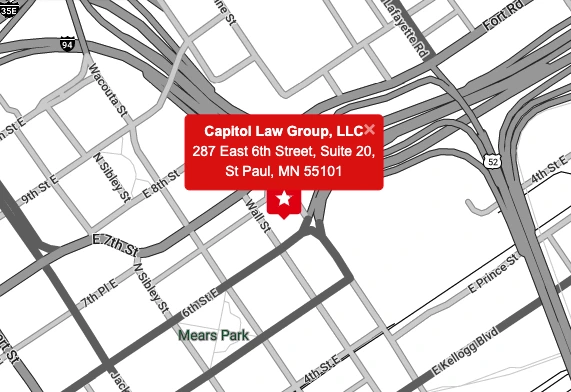The Cops Found Drugs… Can A St. Paul Criminal Defense Lawyer Beat the Charges?

At trial, Ramsey County prosecutors must establish every element of a drug possession case beyond a reasonable doubt. So, a number of defenses are available.
For example, a person could literally be sitting on drugs and not “possess” them in a legal sense. Furthermore, all officers conduct field tests, which is usually not much more than tasting the substance. Sometimes, a laboratory test yields much different results. Finally, especially with regard to synthetic marijuana possession cases, the substance may not have been illegal at the time of the arrest.
However, procedural defenses are much more common. Generally, unless the prosecutor can cure the procedural defect, the judge will throw the case out of court. And, since no one can turn back the clock and change the past, procedural errors during the arrest or investigation are very difficult to correct.
Procedural Rules in St. Paul Criminal Defense Matters
The Constitution’s Fourth Amendment is perhaps the most important source of criminal procedure rules. This provision originally only applied to federal cases. But the Supreme Court used the Fourteenth Amendment to apply its prohibitions against unreasonable searches and seizures to Minnesota and other state governments as well.
As law-and-order judges like to point out, the Fourth Amendment only prohibits unreasonable searches and seizures. Both the language in this provision and subsequent Supreme Court opinions give St. Paul criminal defense lawyers a very good idea of what “reasonable” means in this context.
The Minnesota Code of Criminal Procedure contains additional rules. A major requirement is a Rule 20 competency requirement. Competency to stand trial is different from legal insanity in several important ways.
Search Warrant Requirements
The Founding Fathers were deeply concerned about excessive police power. In colonial times, authorities often used writs of assistance, or blank search warrants, to seize property with little or no cause. To protect liberty, voters insisted on a provision like the Fourth Amendment. This mandate requires that search warrants be based on probable cause. Today, St. Paul criminal defense lawyers take the place of the Founding Fathers in terms of defending liberty.
Many times, the warrant relies, at least in large part, on informer tips. These tips are inherently suspect. Sometimes, the tipster has a criminal record. In almost all cases, police officers paid the tipster for providing information. So, courts scrutinize these tips very closely.
Once upon a time, Ramsey County judges used an objective test to determine tip reliability. But a number of years ago, the Supreme Court abandoned that approach and embraced a totality-of-the-circumstances analysis. So, to determine reliability, judges look to several factors, including:
- Source: As mentioned, most informers have criminal records. Furthermore, many informers have provided information in the past. If that information was false, there’s a pretty good chance the current information was false as well, especially if the informer has a checkered past.
- Time: Drug tips have extremely short shelf lives. If the information is more than a few hours old, it is probably stale. Officers cannot use the old “we couldn’t find a judge in time” excuse. Back in the old days, that argument might have worked. But today, Ramsey County has a number of judges, and all of them have cell phones.
- Specificity: “The house at the corner of Main and Elm is a drug house” is not a very specific tip, especially if there is a house on each corner. “101 Main is a drug house,” on the other hand, probably suffices for probable cause.
Prosecutors cannot work backward. They cannot argue that if the information was correct, the tip must have been reliable. Each tip stands or falls on its own merits.
The warrants themselves must also be specific. A general search warrant is basically the same thing as a writ of assistance. So, the warrant must be specific in terms of the location and type of substance (e.g. heroin in the basement or meth in the garage). If the informer is unable to provide this kind of specific information, the informer is probably not very reliable.
Common Search Warrant Exceptions in Drug Cases
Over the years, the Supreme Court has carved out a number of exceptions to the search warrant requirement.
Consent is probably the most commonly-used search warrant exception in property search cases. If the owner consents to the search, officers can literally tear the house or car apart in their search for contraband, and a St. Paul criminal defense lawyer will have a hard time excluding seized evidence.
Effective consent is sometimes an issue. For example, Sam might consent if officers ask to “have a look around.” However, if officers use knives to rip open the furniture, that action may exceed the scope of Sam’s consent.
Authority to consent may be an issue as well. Assume Sam is a roommate whose name is not on the lease. Legally, he lacks the authority to give consent for the search of the house. However, if officers reasonably believe that Sam has authority, the search is legal.
These matters are often complex, because typically, officers do not ask many questions about a person’s authority. However, the line is a little clearer in vehicle cases. Everyone knows that the driver is almost always the owner.
Plain view is another exception. Officers who are legally in a place may seize any contraband they see in plain view. That authority usually extends to partial plain view situations (e.g. officers see a gun handle protruding from under a seat). However, officers may not use binoculars, microscopes, or other implements to bring things into plain view.
Rely on Dedicated Criminal Defense Attorneys in St Paul
Even if police found drugs, the defendant may or may not be convicted in court. For a free consultation with experienced St. Paul criminal defense lawyers, contact Capitol City Law Group at 651-705-8580, or visit us in person at 287 6th St E Suite 20, St Paul, MN 55101. Home and jail visits are available.




